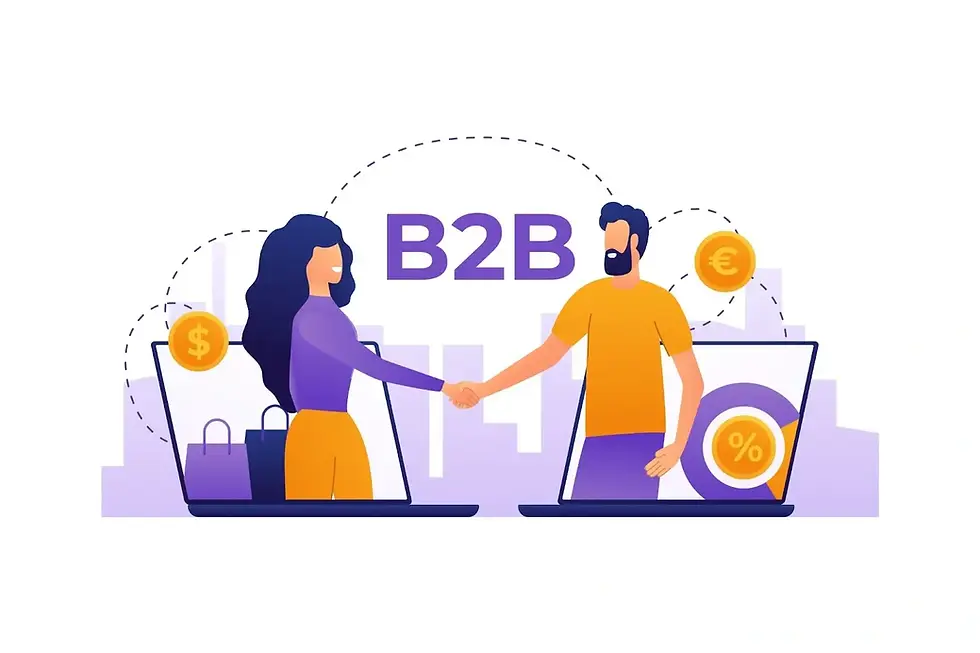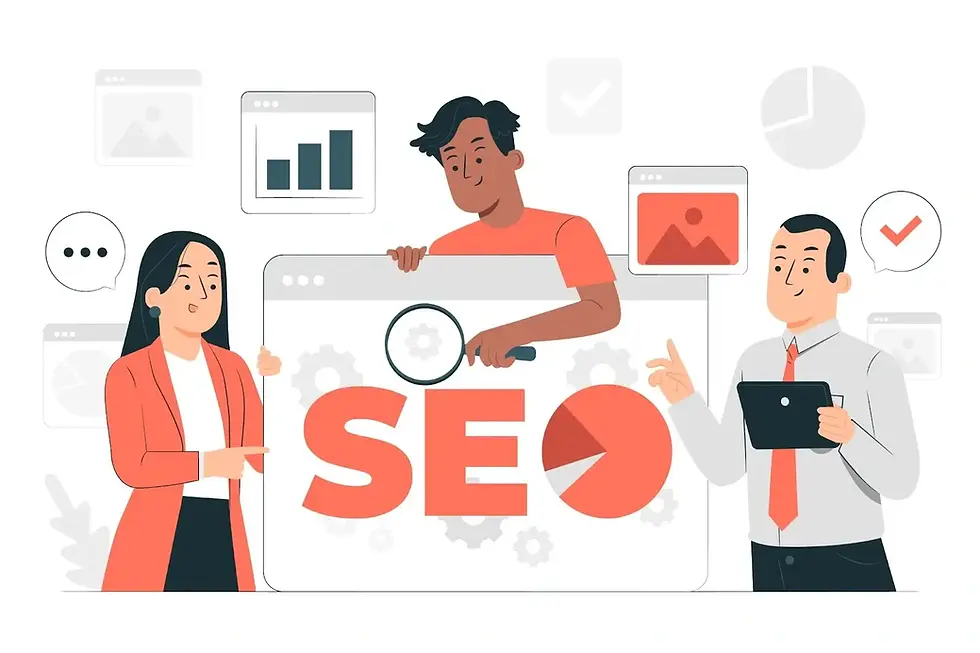B2B CONTENT MARKETING FOR SMALL BUSINESSES
- Mugambwa Methodius
- Aug 9, 2023
- 7 min read

Starting a business is no easy feat. It takes dedication, hard work, and a solid strategy to establish your brand and generate revenue. But here's the secret to standing out in today's competitive marketplace Business to Business content marketing.
With technology and digital marketing, your business can reach a vast target audience for better conversions. Embrace content marketing to ignite customer engagement, amplify your brand presence, and unlock a new stream of leads. B2B content marketing can enhance your small business, making it an invaluable investment. Let's take your business to new heights.
WHY SMALL BUSINESSES NEED CONTENT MARKETING
Every day, millions of people go online to search for products and services they need. As a small business owner, you need to be where your potential customers are, and that's why you need content marketing. Content marketing is a marketing technique that involves creating and distributing valuable content to attract and retain a clearly defined audience.
Content marketing is defined as a strategic approach that creates and shares valuable, relevant content to engage a target audience. The goal is to provide entertaining or educational content that meets their needs. Various forms include blog posts, videos, social media, and more. It builds brand awareness, credibility, loyalty, and drives customer action. By understanding the target audience and creating compelling content, businesses can attract and retain customers for growth and success.
STEPS TO CREATING A SUCCESSFUL B2B CONTENT MARKETING STRATEGY

As a business owner or marketer, you might be wondering how you can reach your target audience and turn them into loyal customers. The answer is through a successful content marketing strategy.
However, creating a content marketing strategy can be confusing and overwhelming, especially if you are new to the world of digital marketing. We'll guide you through the necessary steps to create a successful B2B content marketing strategy that will help you achieve your business goals.
1. Define Your Goals: Every successful strategy starts with a clear set of objectives. What do you want to achieve with your content marketing efforts? This could be increasing brand awareness, generating high-quality leads, driving website traffic, boosting customer engagement, or improving conversion rates. Having well-defined goals will guide your content creation and help you measure the success of your strategy.
2. Understand Your Audience: The next step is to gain a deep understanding of your target audience. This involves developing detailed buyer personas, which represent your ideal customers. You need to understand their demographics, interests, pain points, and buying behavior. This information will enable you to create content that resonates with your audience, meets their needs, and drives them to take action.

3. Conduct a Content Audit: Before you start creating new content, it's important to assess your existing content. This process, known as a content audit, involves reviewing and evaluating all the content you've already published. This will help you identify what types of content are performing well, where there are gaps in your content, and what topics or formats you should focus on in the future.
4. Create a Content Calendar: Organizing your content production is key to ensuring consistency and effectiveness. A content calendar acts as a roadmap for your content marketing activities. It outlines what content will be created, when it will be published, who is responsible for its creation, and how it will be promoted. This tool helps keep your team on track and ensures that your content aligns with your overall marketing goals.
5. Produce High-Quality Content: The heart of your content marketing strategy is the content itself. Your content should be informative, engaging, and relevant to your audience. It should provide value, whether by solving a problem, providing new insights, or entertaining your audience. High-quality content can help establish your brand as a thought leader in your industry, build trust with your audience, and drive more traffic to your website.
6. Optimize for SEO: To increase the visibility of your content, it's crucial to optimize it for search engines. This involves incorporating relevant keywords into your content, optimizing meta descriptions and title tags, creating quality backlinks, and ensuring your website is mobile-friendly. Effective SEO can help your content rank higher in search engine results, leading to more organic traffic.
7. Promote Your Content: Publishing your content is just the first step. To reach a wider audience, you need to actively promote your content through various channels. This could include social media platforms, email newsletters, guest blogging, and paid advertising. By diversifying your promotion strategies, you can reach more potential customers and drive more traffic to your site.
8. Measure and Analyze Performance: Finally, it's critical to track the performance of your content marketing efforts. Use analytics tools like Google Analytics or SEMrush to measure key metrics such as website traffic, social media engagement, lead generation, and conversion rates. These insights will help you understand what's working, what's not, and how you can improve your strategy.
WHY B2B CONTENT MARKETING MATTERS FOR SMALL BUSINESSES
Imagine you own a small business that supplies office furniture to other small businesses, and you’re looking for ways to boost your sales and grow your customer base. You know you need to advertise, but you don't want to spend too much money on traditional advertising methods like TV ads, billboards, or print ads.
This is where content marketing comes in. By creating valuable, informative, and engaging content, you can attract potential customers to your website and convert them into loyal customers over time. Let's explore some of the ways in which content marketing can truly elevate your business.
Driving Website Traffic.
Content marketing acts as a powerful magnet, drawing potential clients to your website. By creating compelling and valuable content, you not only captivate visitors but also enhance the flow of traffic to your site, thereby increasing the likelihood of conversions. This strategy enables you to engage with your audience effectively, establish your brand authority, and ultimately drive business growth.
Build a Relationship with Your Audience.
Knowing your audience is the first step in any marketing campaign. By creating content that resonates with your audience's interests and needs, you can foster a strong relationship with them, leading to increased customer loyalty and retention.

Follow Online & Offline Trends.
Staying abreast of online and offline trends can help you create content that is timely and relevant. This can increase your content's visibility and engagement, ultimately driving more traffic to your website.
Increase Brand Awareness.
Content marketing is a potent tool for boosting brand awareness. Consistently creating valuable content positions your brand as a trailblazer, solidifying your reputation as a thought leader. This increases credibility and attracts a dedicated audience who values your expertise. Leverage content marketing to establish your brand as an authoritative voice, gaining visibility and influence.
Generate Online Sales.
Effective marketing has the power to boost online sales by attracting prospective customers to your website. It presents a valuable opportunity to showcase your products or services, emphasizing their unique features and benefits. With thoughtful word choice, well-structured narratives, and compelling storytelling, you can captivate and engage your target audience, leaving a lasting impression that drives conversions.
Lead Generation.
Compelling content is crucial for lead generation. By providing valuable insights and solutions, you establish your business as an industry authority. This entices potential clients and encourages them to share contact information in exchange for your expertise. With a solid content strategy, position yourself as a trusted resource to capture your target audience's attention, driving lead generation and business growth.
Nurturing Leads.
Effective content plays a vital role in nurturing leads throughout the buying journey. It educates, addresses concerns, and builds trust, establishing your business as the natural choice. By delivering valuable information and fostering connections, your content becomes a powerful tool in guiding prospects towards conversion. With a focus on providing relevant content, you can be effective.
Improving Conversion Rates.
Crafting personalized content that resonates with your audience's pain points and aspirations can significantly boost conversion rates. By showing how your product/service fulfills their unique needs, you go beyond a sales pitch to become a valuable provider of tailored solutions. This approach builds stronger connections and nurtures long-term relationships based on trust and understanding.
EFFECTIVE B2B CONTENT MARKETING STRATEGIES FOR SMALL BUSINESSES
As a small business owner, you've likely realized the importance of having a successful content marketing strategy for your company to thrive in the digital age. But with so many companies already utilizing this method, how can you stand out and make your content marketing effective? In this blog, we will provide you with effective B2B content marketing strategies that will enable your small business to reach and engage with your target audience while generating ROI.
Define Your Target Audience and Their Needs.
Understanding of your target audience is crucial. Identify their challenges, goals, issues, and preferences. Tailor your content to address these needs and demonstrate how your product or service can provide the perfect solution. By doing so, you can effectively engage with your audience and establish a strong connection based on mutual understanding and value.

Craft an Effective Content Strategy.
A well-structured content strategy is crucial for achieving your objectives, conveying core messages effectively, and utilizing various distribution channels. By ensuring coherence and intent in your content creation endeavors, you can anchor your audience's engagement and foster alignment with your brand. With a readability score of 8, this paragraph strives to offer a clear and concise overview while maintaining readability.
Analyze Your Competition and Differentiate Yourself.
In order to identify gaps in the market, it is crucial to conduct a comprehensive competitor analysis. This analysis will help you pinpoint areas where you can distinguish yourself from others. By highlighting your unique selling points, you can effectively showcase your distinctive qualities to your target audience. Incorporating these key elements into your content will enable you to capture their attention and stand out in the market.
Develop Relevant and Valuable Content.
To effectively engage your target audience, it is crucial to create content that resonates with them. Craft compelling blog posts, comprehensive instructional guides, thought-provoking case studies, and in-depth industry reports. By delivering tangible value, you can establish your business as a trusted authority in your niche. This will help you build credibility and foster lasting relationships with your audience.
Leverage Various Content Formats.
Expand content toolkit to cater to diverse audience preferences. Utilize a variety of mediums such as blogs, videos, interactive webinars, engaging podcasts, visually captivating infographics, and concise social media posts. By doing so, you can broaden your reach and captivate a wider audience, attracting and retaining more viewers.
Optimize for SEO.
Implement effective Search Engine Optimization techniques to ensure your content ranks prominently on search engine results pages. Well-optimized content heightens visibility and propels organic traffic to your website.

Create Email Marketing Campaigns.
Email marketing continues to be a powerful tool for nurturing leads. Craft compelling and personalized email campaigns that deliver valuable content, cultivate relationships, and gracefully guide prospects through the intricate buyer's journey.
Conclusively, B2B Content Marketing is a crucial strategy for small businesses looking to thrive in today's competitive landscape. By leveraging effective content marketing techniques and targeting the right audience, small businesses can establish their brand, attract new clients, and drive growth. With the right approach and consistent effort, small businesses can unlock the true potential of B2B Content Marketing and achieve their desired success.
By: Mugambwa Methodius.






Comments